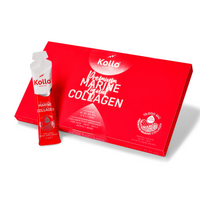Marine Collagen for Menopause

Marine collagen: the secret weapon for midlife and menopause
Collagen has become quite the buzzword in both the health and beauty industries with many advocating for its benefits. Marine collagen comes from the skin and scales of fish. Advocates praise its high bioavailability and ability to help our bodies withstand the signs of ageing. As such, it has become a popular choice as a supplement for people in midlife and women going through perimenopause.
But just what is all the hype with collagen? Can it really help with the challenges of this stage of life? Read on to get some honest answers.
What is collagen?
Collagen is a protein that is extremely abundant in the human body (and the bodies of many other animals). It provides structure to tissues and is a key component of our bones, skin, ligaments, tendons and cartilage. Our bodies synthesise collagen naturally to help keep skin firm, bones dense and joints supple, among other things.
As you can imagine, its presence is very important for both our health and cosmetic considerations. But the levels of collagen in our bodies decline as we get older.
The different types of collagen
There have been as many as 28 types of collagen identified. They differ in the architecture of the molecules and the role they play in the body. One common feature of all collagen fibrils is that they have at least one triple helix structure.
Though there are many types, the main types of collagen are as follows:
-
Type I collagen: this is the collagen that is most abundant in marine collagen supplements, and it makes up 90% of the collagen in our bodies. Its dense structure makes it ideal for our skin, bones, ligaments and tendons.
-
Collagen type II: this collagen type is mostly found in elastic cartilage that provides support for joints.
-
Type III collagen: this is primarily located in our muscles, arteries and organs.
-
Collagen type IV: this exists in the various layers of our skin.
-
Type V collagen: helps provide structure to tissues and cells in the corneas, some layers of the skin and also the hair and even the placenta.
How do I know if my collagen levels are low?
Everyone’s collagen levels deplete as they age. But most people should continue to produce enough for their bodies to function correctly. However, when your collagen levels are low, you will likely find that the following signs materialise in your body:
-
Wrinkles and fine lines in the skin
-
Unexplained stiffness and discomfort in the joints
-
Weaker bones more prone to fractures
-
Slow recovery from exercise and injury
-
Brittle nails
-
Thin, lifeless hair
-
Gastrointestinal issues
With lower levels of collagen in the body, the structures it supports begin to diminish. Since the protein is so abundant in our bodies, the effects have an impact virtually everywhere.
What causes collagen depletion?
The main cause of lower collagen levels in our bodies is age. Collagen production begins to decrease as early as our twenties, but it is after you turn 30 that this becomes more pronounced. People often start noticing the effects of this the further they get into their thirties. The signs become increasingly clear as we enter midlife and beyond.
There are, however, other factors that can make collagen depletion worse. These include:
-
Loss of oestrogen during menopause
-
Exposure to ultraviolet (UV) light from the sun
-
Poor diet choices
-
Air pollution
-
Stress
-
Bad habits like smoking, drinking or using recreational drugs
Genetics also play a role in the rate of collagen depletion, but it happens to us all eventually.
What foods are high in collagen?
If you are after a food that is rich in actual collagen, the go-to option is bone broth. This comes from cooking bones in water for several hours, causing collagen molecules to break off into the liquid. However, it’s important to understand that these collagen molecules have a high molecular weight. This means it is difficult for your digestive system to absorb them into your bloodstream.
Other foods that can help with collagen production include:
-
Eggs: they contain the amino acids glycine and proline, which are some of the building blocks of collagen.
-
Meat: collagen is most abundant in skin, cartilage, tendons and ligaments. These are not popular for eating but you will get many of the components of collagen from red meat.
-
Fish: again, the collagen is mostly in parts we don’t usually eat (skin and scales) but you will get some of the amino acids from the meat.
-
Spirulina: for a plant-based option, spirulina is very high in amino acids. It provides some of the building blocks required to produce collagen
It can also be helpful to eat foods containing other nutrients that facilitate good health in the cells and tissues. We need vitamin C, B vitamins, calcium, antioxidants and virtually every other nutrient. Therefore, it’s important to get lots of variety and healthy foods in your diet to promote good collagen production.
Why is it beneficial and to who?
It is beneficial to try and maintain the highest possible levels of collagen in your body. This is because it is so important for healthy function throughout your anatomy. Everyone can benefit from working to maintain their collagen, but the benefits will be most apparent for people in midlife and beyond.
People who suffer from conditions like eczema, acne or arthritis may also experience improvements from boosting their collagen levels. We can say the same for those who exercise regularly or suffer from stress.
Here’s a breakdown by age group:
-
20s: collagen can help maintain hair and nail health. It can also reduce breakouts on the skin, prevent stretch marks, improve gut health and promote workout recovery.
-
30s: collagen may help reduce the early signs of ageing whilst providing all the benefits for people in their 20s.
-
40s: this is when collagen becomes more important. You can minimalise the signs of ageing including skin, joints and more. If you enter perimenopause during this decade, it can help with the symptoms you experience.
-
50s: collagen can help maintain bone and joint health whilst keeping the impact of ageing on your skin, hair and nails to a minimum. It may help reduce the symptoms associated with oestrogen and testosterone decline. It may also help with injury recovery, weight loss and more.
-
60+: this is when your collagen is at its lowest and you need to do all you can to maintain the best possible health in the tissues of your body.
Why take a supplement?
A marine collagen supplement is a very powerful way to fuel your body with the building blocks it needs to produce collagen naturally. As previously mentioned, the collagen molecules from bone broth are large and difficult for the body to absorb. Any other collagen building blocks you get from your diet are usually incomplete. This means they are unable to deliver everything your body needs for continuous collagen synthesis.
Marine collagen supplements like Kollo contain originate from fish, which is Type I collagen (the most abundant in our bodies). It has a very similar molecular structure to the collagen in our bodies and is bioavailable. This is increased by breaking the pure collagen molecules down through a process called hydrolysis. The result is smaller amino acid chains called collagen peptides (or hydrolysed collagen). These have a low molecular weight and are very easy for our bodies to absorb.
When taken in the form of a daily collagen supplement, collagen peptides provide our bodies with everything they need to produce that all-important collagen. It starts fast and can be continuously produced thanks to the regularity of the dosage you get from your supplement. So you will get maximum benefit from increased collagen levels in your body.
How much and how often?
Different physical benefits of collagen supplements come from different dosages taken regularly. A good benchmark is to take 10 grams of high grade marine collagen, like what's included in every Kollo sachet, every single day. This covers a broad spectrum of bodily requirements to reap the benefits for your skin, joints, bones, hair, nails, gut and more.
Are there any negative side effects?
There are no real any significant side effects associated with collagen supplements. It’s important to note that marine collagen comes from fish. Thus, if you have a known allergy to seafood or crustaceans, it might be better to try a different form of collagen like bovine or porcine.
A few studies have found that a tiny minority of people report a bad taste in the mouth after taking marine collagen. Fewer still have reported minor digestive upset and bloating. But they are far from the norm – collagen is much more likely to improve digestion than disrupt it.
How do I know if it is working?
You should be able to see and feel the benefits when they come into play. It usually takes at least two months to start experiencing the benefits. The wait is longer for improvements to bone density, so be persistent and patient.
You should begin to notice some benefits to your skin, nails and your energy levels after the first two months. More benefits for your joints should appear after a few more months.
When is the right time to start taking marine collagen?
As collagen levels can begin to decline in your twenties, you can start taking collagen supplements as early as you like. We have already listed some of the benefits you may experience from starting early. But you are likely to experience the most benefits from midlife onwards. This applies to both men and women, but its benefits in midlife might be most potent for women going through menopause.
Middle age is when a number of issues associated with collagen depletion become more pronounced. This can start in your forties or fifties, and will include things like:
-
Fine lines and wrinkles
-
Sagging skin
-
Thinning hair
-
Brittle nails
-
Discomfort in joints
-
Loss of bone density
When women enter menopause, the loss of collagen can accelerate quite drastically. In fact, women in the first 5 years of menopause may lose up to 30% of their collagen production capabilities. This is due to the reduction in oestrogen, and the consequences can include accelerated signs of ageing. This is in addition to things associated specifically with menopause, such as hot flashes.
Collagen supplements can help reduce the development of fine lines and wrinkles. It can improve skin elasticity, reduce inflammation that causes joint discomfort, promote healthy hair and nails, keep our bone density high and generally boost energy levels.
Evidence indicates that menopausal women who take collagen supplements have a less stressful experience. Similarly, those same benefits for skin, hair, bones and joints can be helpful for men as they enter middle age and beyond.





















